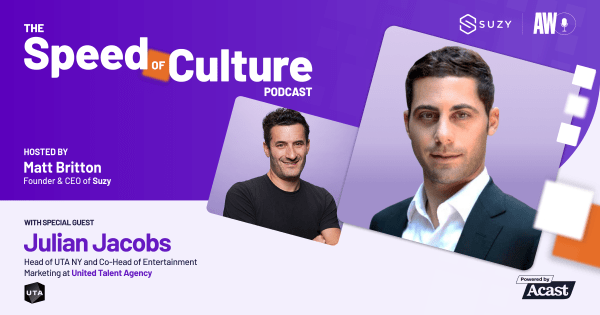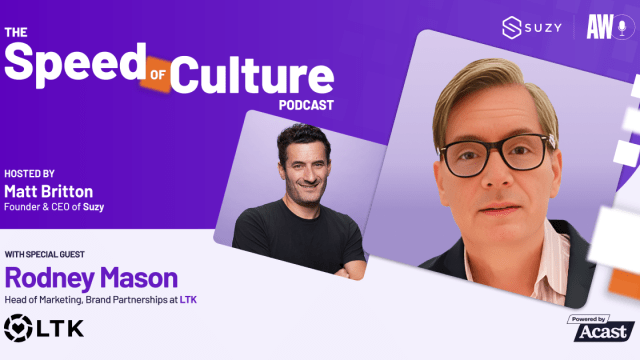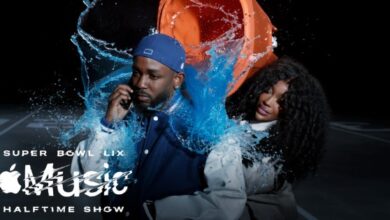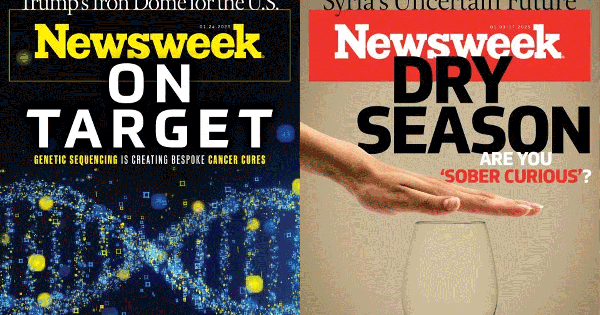Finding comfort in chaos: UTA’s Julian Jacobs on the impact of driving

The future of marketing lies at the intersection of culture and commerce, where brands must seamlessly integrate into the world of entertainment to stay relevant.
In this episode of The Speed of Culture podcast, Matt Britton speaks with Julian Jacobs, Co-Head of Entertainment Marketing at United Talent Agency and Head of UTA NY.
Julian shares his insights on how UTA is bridging the gap between brands and culture, fostering meaningful partnerships with entertainment properties like Barbie and White Lotus, and navigating the evolving creator economy.
“How can we, as a brand, add value not only to the promotion, but also to the creative experience you are trying to portray with your project? When we successfully negotiate these conversations, we find that these partnerships not only sing, but also last,” he says on the podcast.
Starting in the mailroom at UTA, Julian rose through the ranks to lead partnerships with some of the world’s biggest brands. Known for his expertise in driving cultural relevance, Julian has been instrumental in iconic collaborations such as Barbie x General Motors and The Bear x Coca-Cola Company. His forward-thinking approach continues to shape the intersection of entertainment, sports and marketing.
Tune in to The Speed of Culture podcast as Julian Jacobs explains how UTA helps brands stay culturally relevant through innovative partnerships and bold strategies.
Key points to remember:
[00:03:59] The Power of Embracing Discomfort and Mentoring — Julian’s journey from UTA’s mailroom to running their New York office shows the power of embracing discomfort. “Being comfortable with discomfort” allowed him to adapt, grow and thrive in a competitive environment. He credits his rise to seeking mentorship from UTA leaders, including CEO Jeremy Zimmer, and learning to navigate uncertainty resourcefully. This approach highlights a valuable lesson: Success often comes not from having all the answers, but from a willingness to learn, adapt, and lean on others for guidance. It’s a mindset that young professionals and seasoned leaders can adopt to excel in a rapidly changing industry.
[00:05:30] Disruption breeds opportunity in Hollywood and beyond — The entertainment industry is at an inflection point, with seismic shifts driven by streaming, evolving audience behaviors and technological advancements. Julian sees this disruption as an area for innovation. As traditional Hollywood faces challenges like budget cuts and strikes, brands and advertisers have a unique opportunity to collaborate with creators and media companies to redefine storytelling. He notes that this chaos has eliminated traditional rules, creating a dynamic environment ripe for bold ideas and revolutionary partnerships. The key for brands is to recognize and seize these moments to meaningfully anchor themselves in the culture.
[00:08:42] Cultural relevance is a business imperative — Cultural resonance is no longer a luxury for brands, it is a necessity. Julian explains how the “slice of marketing” once reserved for cultural relevance has become the cornerstone of branding. The challenge for CMOs is to anticipate cultural trends and align them with their brand identity in an authentic way. Whether it’s partnerships with creators, entertainment properties or sports, brands must navigate this complex landscape to connect with younger audiences like Gen Z and millennials, who demand engagement more meaningful and values-driven. Brands that master this balance can form lasting emotional connections with their consumers.
[00:15:51] Redefining the creator economy: beyond transactions — The creator economy, while thriving, has reached saturation point, with brands struggling to stand out amid a sea of influencer collaborations. Julian believes the future lies in long-term strategic partnerships where creators are treated as business collaborators rather than just amplification channels. By supporting creators in creating their own brands, like Emma Chamberlain’s coffee line or Issa Rae’s businesses, brands can foster more authentic relationships and generate greater value. This evolution offers a model for brands to move from transactional campaigns to collaborative partnerships that drive cultural impact and consumer trust.
[00:18:45] Sport as a platform for cultural convergence — Sport has become much more than a competitive scene: they are now cultural engines where fashion, streaming and celebrities intersect. Julian explains how this convergence is creating unprecedented opportunities for brands to engage with diverse audiences. From partnerships with leagues like the NBA to collaborations with athletes starting their own businesses, sports provide a dynamic, live platform for storytelling. Additionally, the rise of social media, fantasy sports, and even gambling has transformed the way fans interact with sports, enhancing its value as a cultural touchpoint. It’s a platform where brands can tell stories, create moments, and tap into culture in a way that few other media can. For brands, investing in sports isn’t just about visibility: it’s also about connecting with audiences on a deeper level.




